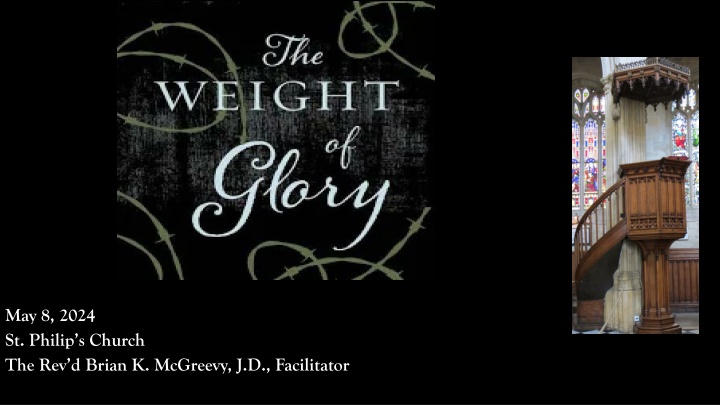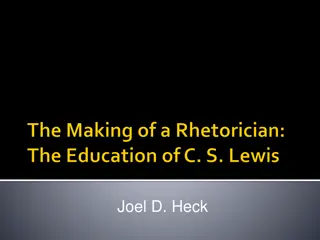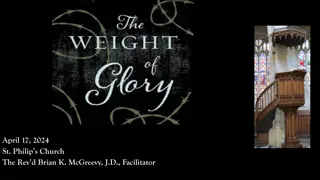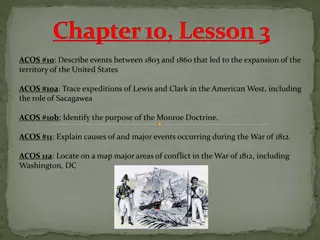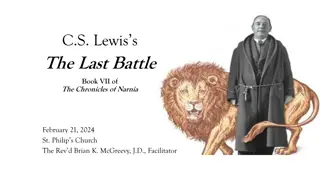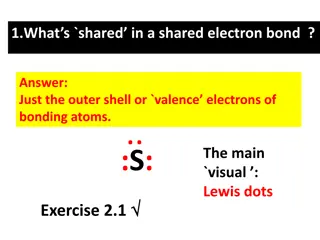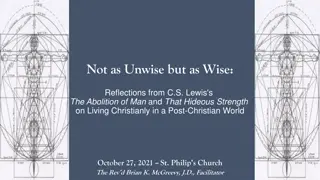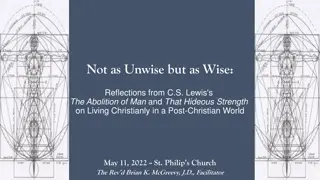Reflections on C.S. Lewis' Sermons during World War II
Explore the impactful sermons and addresses delivered by C.S. Lewis during World War II, focusing on themes of faith, resilience, and hope amidst the turmoil of war. The collection includes notable pieces like "Learning in War-time" and "The Weight of Glory," offering profound insights and wisdom for today's challenging times.
Download Presentation

Please find below an Image/Link to download the presentation.
The content on the website is provided AS IS for your information and personal use only. It may not be sold, licensed, or shared on other websites without obtaining consent from the author.If you encounter any issues during the download, it is possible that the publisher has removed the file from their server.
You are allowed to download the files provided on this website for personal or commercial use, subject to the condition that they are used lawfully. All files are the property of their respective owners.
The content on the website is provided AS IS for your information and personal use only. It may not be sold, licensed, or shared on other websites without obtaining consent from the author.
E N D
Presentation Transcript
May 8, 2024 St. Philip s Church The Rev d Brian K. McGreevy, J.D., Facilitator
So we do not lose heart. Though our outer selfis wasting away, our inner self is being renewed day by day. For this light momentary affliction is preparing for us an eternal weight of glory beyond all comparison, as we look not to the things that are seen but to the things that are unseen. For the things that are seen are transient, but the things that are unseen are eternal. 2 Corinthians 4:16-18 April 10, 2024 St. Philip s Church
How to approach this class: --On the beach --Snorkeling --Scuba diving --Email list How to read this book: --Try reading aloud and slowly, looking for layers of meaning --Look for themes/underline and highlight passages that resonate with you April 10, 2024 St. Philip s Church The Rev d Brian K. McGreevy, J.D., Facilitator
The Book A collection of sermons and addresses given by C.S. Lewis during World War II and shortly thereafter 1. The Weight of Glory--June 8, 1941: Church of St. Mary the Virgin, Oxford 2. Learning in War-time--October 22, 1938: Church of St. Mary the Virgin, Oxford 3. Transposition--May 28, 1944: Chapel of Mansfield College, Oxford 4. Is Theology Poetry?--November 6, 1944: Socratic Club, Oxford 5. The Inner Ring-- December 14, 1944: King s College, University of London 6. Membership February 10, 1945: Society of St. Alban and St. Sergius, Oxford 7. On Forgiveness--August 28, 1947: Church of St. Mary s, Sawston, Cambridgeshire 8. A Slip of the Tongue--January 29, 1956:. Chapel of Magdalene College, Cambridge We will be focusing on only two of these, Learning in War-time and The Weight of Glory, but all of them are well worth reading!
Context: England in War-time 1939 September 3 Following Hitler s aggression, England and France declare war on Germany October 22 Lewis preaches Learning in War-time sermon in Oxford 1940 September 7 The Blitz begins, with nightly devastating bombing raids on London for months 1941 February 7 Lewis invited to give talks on BBC April 9 Lewis gives first wartime RAF talk In the month before Lewis preached The Weight of Glory, Greece falls to Hitler, as does Yugoslavia, and bombs continue to fall on London, hitting Parliament and St. Paul s Cathedral June 8 Lewis delivers The Weight of Glory sermon in Oxford August 6 First BBC talk by Lewis 1944 June 6, 1944 D-Day invasion of Normandy 1945 March 29, 1945 Final German bombing raid on England May 8, 1945 Churchill declares VE Day as Germany surrenders July 16, 1945 Lewis gives last RAF talk
The venue: The University Church of St. Mary the Virgin, Oxford
The two Oxford sermons at the Church of St. Mary the Virgin: Learning in War-time and The Weight of Glory --Canon T. Richard ( Dick ) Milford, Vicar of St Mary s and Lewis s contemporary, issued the invitation to Lewis for both these sermons. Milford had been impacted by The Pilgrim s Regress (1933), Lewis s first Christian book. --On October 22, 1939, six weeks after England and France declared war on Germany, Lewis preached None Other Gods: Culture in War-Time for Sunday evening Evensong at St. Mary s, published later as Learning in War-Time. --On June 8, 1941, at the height of the war and after eight months of the Blitz bombings of London, Lewis returned to preach at St. Mary s at Evensong, this time preaching The Weight of Glory to an overflow crowd perhaps the largest crowd ever assembled there, with every seat taken, people sitting in the aisles and windows, and gathered outside. Learning in War-time Setting the Stage for The Weight of Glory Lewis asks how any of us can think it worthwhile to begin what we probably cannot finish, or to engage in tranquil or flippant activities when there is life-and-death urgency at hand, but points out that humanity is always facing crises in ways that war amplifies. He has in mind not only that we lurch from wars, to disasters, to tyrannies, but that we at all times have before us the question of our eternal destiny. It is part of our nature, he suggests, to create, reason, and laugh in the midst of pending disaster.
The Weight of Glory Preached June 8, 1941 As Lewis had preached in Learning in War-time, man is always on the precipice, and worthy pursuits must be pursued even in times of extremity, especially within the framework of understanding our eternal destiny and the importance of the quest for knowledge and Beauty. In the darkest days of World War II where life was uncertain and death was a present reality, providing a framework for understanding Heaven and Eternity was enormously important, and that is what Lewis addresses in this sermon. We will cover the sermon in four parts, looking at key themes: Week 1: Unselfishness versus love, Desire and Rewards, Desire for Heaven, and Desire not attached to its true object Week 2: Desire, Longing, Beauty, Enchantment, and Heaven Week 3: Being with Christ, Two Types of Glory, Glory as Good Report, the Weight of Glory, Hoping for Glory
The Weight of Glory: References in the third section --John Milton (1608-1674): author of Paradise Lost --Samuel Johnson (1709-1783): English poet and critic immortalized in Boswell s Life of Samuel Johnson (1791) --Thomas Aquinas (1225-1274): Catholic theologian and philosopher, proponent of natural theology and author of Summa Theologica --Prospero s book: In Shakespeare s play The Tempest, Prospero the magician gives up magic at the end of the play and throws his book of spells into the ocean --John Keats (1795-1821) Lewis quotes from Keats poem Endymion about the journey homeward to habitual self -
The Weight of Glory, Part 3 The promises of scripture may very roughly be reduced to five heads. It is promised, firstly, that we shall be with Christ; secondly, that we shall be like Him; thirdly, with an enormous wealth of imagery, that we shall have glory ; fourthly, that we shall, in some sense, be fed or feasted or entertained; and, finally, that we shall have some sort of official position in the universe ruling cities, judging angels, being pillars of God s temple. The first question I ask about these promises is: Why any of them except the first? Can anything be added to the conception of being with Christ? For it must be true, as an old writer says, that he who has God and everything else has no more than he who has God only. I think the answer turns again on the nature of symbols. For though it may escape our notice at first glance, yet it is true that any conception of being with Christ which most of us can now form will be not very much less symbolical than the other promises; for it will smuggle in ideas of proximity in space and loving conversation as we now understand conversation, and it will probably concentrate on the humanity of Christ to the exclusion of His deity. And, in fact, we find that those Christians who attend solely to this first promise always do fill it up with very earthly imagery indeed in fact, with hymeneal or erotic imagery. I am not for a moment condemning such imagery. I heartily wish I could enter into it more deeply than I do, and pray that I yet shall. But my point is that this also is only a symbol, like the reality in some respects, but unlike it in others, and therefore needs correction from the different symbols in the other promises. The variation of the promises does not mean that anything other than God will be our ultimate bliss; but because God is more than a person, and lest we should imagine the joy of His presence too exclusively in terms of our present poor experience of personal love, with all its narrowness and strain and monotony, a dozen changing images, correcting and relieving each other, are supplied.
I turn next to the idea of glory. There is no getting away from the fact that this idea is very prominent in the New Testament and in early Christian writings. Salvation is constantly associated with palms, crowns, white robes, thrones, and splendour like the sun and stars. All this makes no immediate appeal to me at all, and in that respect I fancy I am a typical modern. Glory suggests two ideas to me, of which one seems wicked and the other ridiculous. Either glory means to me fame, or it means luminosity. As for the first, since to be famous means to be better known than other people, the desire for fame appears to me as a competitive passion and therefore of hell rather than heaven. As for the second, who wishes to become a kind of living electric light bulb? When I began to look into this matter I was shocked to find such different Christians as Milton, Johnson, and Thomas Aquinas taking heavenly glory quite frankly in the sense of fame or good report. But not fame conferred by our fellow creatures fame with God, approval or (I might say) appreciation by God. And then, when I had thought it over, I saw that this view was scriptural; nothing can eliminate from the parable the divine accolade, Well done, thou good and faithful servant. With that, a good deal of what I had been thinking all my life fell down like a house of cards. I suddenly remembered that no one can enter heaven except as a child; and nothing is so obvious in a child not in a conceited child, but in a good child as its great and undisguised pleasure in being praised. Not only in a child, either, but even in a dog or a horse. Apparently what I had mistaken for humility had, all these years, prevented me from understanding what is in fact the humblest, the most childlike, the most creaturely of pleasures nay, the specific pleasure of the inferior: the pleasure of a beast before men, a child before its father, a pupil before his teacher, a creature before its Creator. I am not forgetting how
horribly this most innocent desire is parodied in our human ambitions, or how very quickly, in my own experience, the lawful pleasure of praise from those whom it was my duty to please turns into the deadly poison of self-admiration. But I thought I could detect a moment a very, very short moment before this happened, during which the satisfaction of having pleased those whom I rightly loved and rightly feared was pure. And that is enough to raise our thoughts to what may happen when the redeemed soul, beyond all hope and nearly beyond belief, learns at last that she has pleased Him whom she was created to please. There will be no room for vanity then. She will be free from the miserable illusion that it is her doing. With no taint of what we should now call self-approval she will most innocently rejoice in the thing that God has made her to be, and the moment which heals her old inferiority complex for ever will also drown her pride deeper than Prospero s book. Perfect humility dispenses with modesty. If God is satisfied with the work, the work may be satisfied with itself; it is not for her to bandy compliments with her sovereign . I can imagine someone saying that he dislikes my idea of heaven as a place where we are patted on the back. But proud misunderstanding is behind that dislike. In the end that Face which is the delight or the terror of the universe must be turned upon each of us either with one expression or with the other, either conferring glory inexpressible or inflicting shame that can never be cured or disguised. I read in a periodical the other day that the fundamental thing is how we think of God. By God Himself, it is not! How God thinks of us is not only more important, but infinitely more important. Indeed, how we think of Him is of no importance except in so far as it is related to how He thinks of us. It is written that we shall stand before Him, shall appear, shall be inspected. The promise of glory is the promise, almost incredible and only possible by the work of Christ, that some of us, that any of us who really chooses, shall actually survive that examination, shall find approval, shall please God. To please God to be a real ingredient in the divine happiness to be loved by God, not merely pitied, but delighted in as an artist delights in his work or a
father in a son it it seems impossible, a weight or burden of glory which our thoughts can hardly sustain. But so it is. And now notice what is happening. If I had rejected the authoritative and scriptural image of glory and stuck obstinately to the vague desire which was, at the outset, my only pointer to heaven, I could have seen no connexion at all between that desire and the Christian promise. But now, having followed up what seemed puzzling and repellent in the sacred books, I find, to my great surprise, looking back, that the connexion is perfectly clear. Glory, as Christianity teaches me to hope for it, turns out to satisfy my original desire and indeed to reveal an element in that desire which I had not noticed. By ceasing for a moment to consider my own wants I have begun to learn better what I really wanted. When I attempted, a few minutes ago, to describe our spiritual longings, I was omitting one of their most curious characteristics. We usually notice it just as the moment of vision dies away, as the music ends or as the landscape loses the celestial light. What we feel then has been well described by Keats as the journey homeward to habitual self . You know what I mean. For a few minutes we have had the illusion of belonging to that world. Now we wake to find that it is no such thing. We have been mere spectators. Beauty has smiled, but not to welcome us; her face was turned in our direction, but not to see us. We have not been accepted, welcomed, or taken into the dance. We may go when we please, we may stay if we can: nobody marks us. A scientist may reply that since most of the things we call beautiful are inanimate, it is not very surprising that they take no notice of us. That, of course, is true. It is not the physical objects that I am speaking of, but that indescribable something of which they become for a moment the messengers. And part of the bitterness which mixes with the sweetness of that message is due to the fact
that it so seldom seems to be a message intended for us, but rather something we have overheard. By bitterness I mean pain, not resentment. We should hardly dare to ask that any notice be taken of ourselves. But we pine. The sense that in this universe we are treated as strangers, the longing to be acknowledged, to meet with some response, to bridge some chasm that yawns between us and reality, is part of our inconsolable secret. And surely, from this point of view, the promise of glory, in the sense described, becomes highly relevant to our deep desire. For glory meant good report with God, acceptance by God, response, acknowledgment, and welcome into the heart of things. The door on which we have been knocking all our lives will open at last.
Being with Christ The promises of scripture may very roughly be reduced to five heads. It is promised, firstly, that we shall be with Christ; secondly, that we shall be like Him; thirdly, with an enormous wealth of imagery, that we shall have glory ; fourthly, that we shall, in some sense, be fed or feasted or entertained; and, finally, that we shall have some sort of official position in the universe ruling cities, judging angels, being pillars of God s temple. The first question I ask about these promises is: Why any of them except the first? Can anything be added to the conception of being with Christ? For it must be true, as an old writer says, that he who has God and everything else has no more than he who has God only. I think the answer turns again on the nature of symbols. For though it may escape our notice at first glance, yet it is true that any conception of being with Christ which most of us can now form will be not very much less symbolical than the other promises; for it will smuggle in ideas of proximity in space and loving conversation as we now understand conversation, and it will probably concentrate on the humanity of Christ to the exclusion of His deity. For to me to live is Christ, and to die is gain. If I am to live in the flesh, that means fruitful labor for me. Yet which I shall choose I cannot tell. I am hard pressed between the two. My desire is to depart and be with Christ, for that is far better. But to remain in the flesh is more necessary on your account. Phil. 1:21-24 Then we who are alive, who are left, will be caught up together with them in the clouds to meet the Lord in the air, and so we will always be with the Lord. I Thess. 4:17 In my Father's house are many rooms. If it were not so, would I have told you that I go to prepare a place for you? And if I go and prepare a place for you, I will come again and will take you to myself, that where I am you may be also. Jn. 14:2-3
Two Types of Glory I turn next to the idea of glory. There is no getting away from the fact that this idea is very prominent in the New Testament and in early Christian writings. Salvation is constantly associated with palms, crowns, white robes, thrones, and splendour like the sun and stars. All this makes no immediate appeal to me at all, and in that respect I fancy I am a typical modern. Glory suggests two ideas to me, of which one seems wicked and the other ridiculous. Either glory means to me fame, or it means luminosity. As for the first, since to be famous means to be better known than other people, the desire for fame appears to me as a competitive passion and therefore of hell rather than heaven. As for the second, who wishes to become a kind of living electric light bulb? After this I looked, and there before me was a great multitude that no one could count, from every nation, tribe, people and language, standing before the throne and before the Lamb. They were wearing white robes and were holding palm branches in their hands. Rev. 7:9 Then the righteous will shine like the sun in the kingdom of their Father. He who has ears, let him hear. Mt. 14:43 But as it is written Eye has not seen, nor ear heard, Nor have entered into the heart of man the things which God has prepared for those who love Him. I Cor. 2:9 Henceforth there is laid up for me the crown of righteousness, which the Lord, the righteous judge, will award to me on that day, and not only to me but also to all who have loved his appearing. 2 Tim. 4:8
Glory as Good Report When I began to look into this matter I was shocked to find such different Christians as Milton, Johnson, and Thomas Aquinas taking heavenly glory quite frankly in the sense of fame or good report. But not fame conferred by our fellow creatures fame with God, approval or (I might say) appreciation by God. And then, when I had thought it over, I saw that this view was scriptural; nothing can eliminate from the parable the divine accolade, Well done, thou good and faithful servant. With that, a good deal of what I had been thinking all my life fell down like a house of cards I suddenly remembered that no one can enter heaven except as a child; and nothing is so obvious in a child not in a conceited child, but in a good child as its great and undisguised pleasure in being praised. Not only in a child, either, but even in a dog or a horse. Apparently what I had mistaken for humility had, all these years, prevented me from understanding what is in fact the humblest, the most childlike, the most creaturely of pleasures nay, the specific pleasure of the inferior: the pleasure of a beast before men, a child before its father, a pupil before his teacher, a creature before its Creator With no taint of what we should now call self-approval she will most innocently rejoice in the thing that God has made her to be, and the moment which heals her old inferiority complex for ever will also drown her pride deeper than Prospero s book. Perfect humility dispenses with modesty. If God is satisfied with the work, the work may be satisfied with itself.
His master said to him, Well done, good and faithful servant. You have been faithful over a little; I will set you over much. Enter into the joy of your master. Mt. 25:21 Blessed is the man who remains steadfast under trial, for when he has stood the test he will receive the crown of life, which God has promised to those who love him. Jas. 1:12 Now if anyone builds on the foundation with gold, silver, precious stones, wood, hay, straw each one's work will become manifest, for the Day will disclose it, because it will be revealed by fire, and the fire will test what sort of work each one has done. If the work that anyone has built on the foundation survives, he will receive a reward. I Cor. 3:12-14 Whatever you do, work heartily, as for the Lord and not for men, knowing that from the Lord you will receive the inheritance as your reward. You are serving the Lord Christ. Col. 3:23-24
The Weight of Glory It is written that we shall stand before Him, shall appear, shall be inspected. The promise of glory is the promise, almost incredible and only possible by the work of Christ, that some of us, that any of us who really chooses, shall actually survive that examination, shall find approval, shall please God. To please God to be a real ingredient in the divine happiness to be loved by God, not merely pitied, but delighted in as an artist delights in his work or a father in a son it it seems impossible, a weight or burden of glory which our thoughts can hardly sustain. But so it is. The LORD your God is in your midst, a mighty one who will save; he will rejoice over you with gladness; he will quiet you by his love; he will exult over you with loud singing. Zeph. 3:17 But the LORD takes pleasure in those who fear him, in those who hope in his steadfast love. Ps. 147:11 My son, do not despise the LORD's discipline or be weary of his reproof, for the LORD reproves him whom he loves, as a father the son in whom he delights. Prov. 3:11-12 For this light momentary affliction is preparing for us an eternal weight of glory beyond all comparison, as we look not to the things that are seen but to the things that are unseen. For the things that are seen are transient, but the things that are unseen are eternal. 2 Cor. 4:17-18
Hoping for Glory If I had rejected the authoritative and scriptural image of glory and stuck obstinately to the vague desire which was, at the outset, my only pointer to heaven, I could have seen no connexion at all between that desire and the Christian promise. But now, having followed up what seemed puzzling and repellent in the sacred books, I find, to my great surprise, looking back, that the connexion is perfectly clear. Glory, as Christianity teaches me to hope for it, turns out to satisfy my original desire and indeed to reveal an element in that desire which I had not noticed. By ceasing for a moment to consider my own wants I have begun to learn better what I really wanted We should hardly dare to ask that any notice be taken of ourselves. But we pine. The sense that in this universe we are treated as strangers, the longing to be acknowledged, to meet with some response, to bridge some chasm that yawns between us and reality, is part of our inconsolable secret. And surely, from this point of view, the promise of glory, in the sense described, becomes highly relevant to our deep desire. For glory meant good report with God, acceptance by God, response, acknowledgment, and welcome into the heart of things. The door on which we have been knocking all our lives will open at last. His master said to him, Well done, good and faithful servant. You have been faithful over a little; I will set you over much. Enter into the joy of your master. Mt. 25:23 And while they were going to buy, the bridegroom came, and those who were ready went in with him to the marriage feast, and the door was shut. Mt. 25:10 Then the King will say to those on his right, Come, you who are blessed by my Father, inherit the kingdom prepared for you from the foundation of the world. Mt. 25:34 Hope does not put us to shame, because God's love has been poured into our hearts through the Holy Spirit who has been given to us. Romans 5:5 To them God chose to make known how great among the Gentiles are the riches of the glory of this mystery, which is Christ in you, the hope of glory. Col. 1:27
Deeper Dive: Taken into the Dance Beauty has smiled, but not to welcome us; her face was turned in our direction, but not to see us. We have not been accepted, welcomed, or taken into the dance. The dance is a favorite image that Lewis uses to portray the abundant life of the Kingdom of God. From Mere Christianity: And now, what does it all matter? It matters more than anything else in the world. The whole dance, or drama, or pattern of this three-Personal life is to be played out in each one of us: or (putting it the other way round) each one of us has got to enter that pattern, take his place in that dance. There is no other way to the happiness for which we were made. Good things as well as bad, you know, are caught by a kind of infection, if you want to get warm you must stand near the fire: if you want to be wet you must get into the water. If you want joy, power, peace, eternal life, you must get close to, or even into, the thing that has them. They are not a sort of prize which God could, if He chose, just hand out to anyone. They are a great fountain of energy and beauty spurting up at the very centre of reality. If you are close to it, the spray will wet you: if you are not, you will remain dry. Once a man is united to God, how could he not live forever? Once a man is separated from God, what can he do but wither and die? But how is he to be united to God? How is it possible for us to he taken into the three-Personal life? You remember what I said in Chapter 1 about begetting and making. We are not begotten by God, we are only made by Him: in our natural state we are not sons of God, only (so to speak) statues. We have not got Zoe or spiritual life: only Bios or biological life which is presently going to run down and die. Now the whole offer which Christianity makes is this: that we can, if we let God have His way, come to share in the life of Christ. If we do, we shall then he sharing a life which was begotten, not made, which always has existed and always will exist. Christ is the Son of God. If we share in this kind of life we also shall he sons of God. We shall love the Father as He does and the Holy Ghost will arise in us. He came to this world and became a man in order to spread to other men the kind of life He has by what I call good infection . Every Christian is to become a little Christ. The whole purpose of becoming a Christian is simply nothing else.+--from Mere Christianity
From Perelandra: The beginning of the Great Game, of the Great Dance, said Tor. I know little of it as yet. Let the eldila speak. The voice that spoke next seemed to be that of Mars, but Ransom was not certain. And who spoke after that, he does not know at all. For in the conversation that followed if it can be called a conversation though he believes that he himself was sometimes the speaker, he never knew which words were his or another s, or even whether a man or an eldil was talking. The speeches followed one another if, indeed, they did not all take place at the same time like the parts of a music into which all five of them had entered as instruments or like a wind blowing through five trees that stand together on a hilltop. We would not talk of it like that, said the first voice. The Great Dance does not wait to be perfect until the peoples of the Low Worlds are gathered into it. We speak not of when it will begin. It has begun from before always. There was no time when we did not rejoice before His face as now. The dance which we dance is at the centre and for the dance all things were made. Blessed be He! Another said, Never did He make two things the same; never did He utter one word twice. After earths, not better earths but beasts; after beasts, not better beasts but spirits. After a falling, not recovery but a new creation. Out of the new creation, not a third but the mode of change itself is changed for ever. Blessed be He! From Letters to Malcolm: Chiefly on Prayer I do not think that the life of Heaven bears any analogy to play or dance in respect of frivolity. I do think that while we are in this valley of tears, cursed with labour, hemmed round with necessities, tripped up with frustrations, doomed to perpetual plannings, puzzlings, and anxieties, certain qualities that must belong to the celestial condition have no chance to get through, can project no image of themselves, except in activities which, for us here and now, are frivolous. . . . It is only in our hours-off, only in our moments of permitted festivity, that we find an analogy [to the joys of heaven]. Dance and game are frivolous, unimportant down here; for down here is not their natural place. Here, they are a moment s rest from the life we were placed here to live. But in this world everything is upside down. That which, if it could be prolonged here, would be a truancy, is likest that which in a better country is the End of ends. Joy is the serious business of Heaven.
At present we are on the outside of the world, the wrong side of the door. We discern the freshness and purity of morning, but they do not make us fresh and pure. We cannot mingle with the splendours we see. But all the leaves of the New Testament are rustling with the rumour that it will not always be so. Some day, God willing, we shall get in. C.S. Lewis, The Weight of Glory
